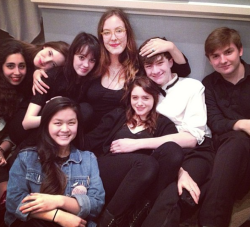
Nashville School of the Arts Choir students backstage before a performance, February 19, 2013, Schermerhorn Symphony Center, Nashville (click photos to enlarge)
At some point early in my teaching career someone told me:
They may forget what you said, but they will never forget how you made them feel.
…or something like that. I don’t remember who said it or when, honestly. Someone might have quoted it at a faculty meeting, or as part of a motivational speech at a workshop or professional development training, or I might have read it in a book or article. Various paraphrases of this proverb exist, purportedly from a number of people including the great Maya Angelou, but the wisdom of the internet currently attributes the first known utterance of this quote to a Mormon official named Carl W. Buehner.
It doesn’t matter who said it. This idea arrived on the scene for me early in my career, and made me begin to seriously consider: what would ultimately be the impact I made on my students? What would the experience they had in my classes, in my program, have on the rest of their lives? What would they remember?
When envisioning the impact I wished our work together to have on my students, it was clear that although the most obvious content of this work was musical skills and knowledge, very few of them would go on to careers where they would use these things directly – in other words, very few would become professional musicians.
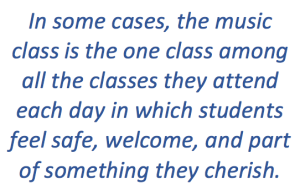 Of course, I wished for my students and ensembles to make great progress, and to perform at ever higher standards of accomplishment. But in the end, this accomplishment – whatever skill level or knowledge they attained – would not be the most important thing they took away from their time in my program.
Of course, I wished for my students and ensembles to make great progress, and to perform at ever higher standards of accomplishment. But in the end, this accomplishment – whatever skill level or knowledge they attained – would not be the most important thing they took away from their time in my program.
I began to try to look consistently at what I was doing – the curriculum, my approach to classroom management, the activities of my classes and ensembles and how they engaged the school community – from the standpoint of what would be the ultimate legacy of my program on these students. What would they actually remember?
Creating Community
Music teachers have a unique position in the school environment in that our content area – an art form – is often more focused on and concerned with the emotional aspects of being human than other subjects children study in school. Children (and adults) crave the acknowledgment of this dimension of their lives, and the means to express and understand it.
Added to this situation is the fact that (in most public schools at least) music classes are not required, but are electives chosen by those who participate – in most cases for emotional reasons. The music class becomes a kind of refuge for these students. In some cases, it is the one class among all the classes they attend each day in which students feel safe, welcome, and part of something they cherish.
If they feel this way about being in your class, they will remember it.
Ultimately, creating a nurturing environment is the long term project of cultivating a micro-community. At the beginning of my career, when I taught in small private elementary and middle schools, this community would embrace the entire school population – students, teachers, and often many parents. Later, when I taught at a larger, public school, this community consisted for the most part of students in my program, and sometimes even only those in certain, more dedicated classes.
Often, arts teachers are among the few teachers that students work with for several consecutive years. As they grow and mature and advance through the grades, students’ academic teachers change, but arts teachers often remain the same, providing a unique opportunity for students to build stronger, more fruitful and abiding relationships with these teachers.
Whatever the case, for many students – especially in elementary school – the community atmosphere you create and nurture may be the first experience of community outside their families. It can be a big responsibility for the music teacher, who finds herself in the position of needing to balance providing a nurturing environment with presenting a challenging and fulfilling curriculum.
They will remember when you are negative
One of the first things that became crystal clear to me is that students will remember your negative manifestations. In the short term, negative behavior on the part of the teacher – sarcasm, anger, frustration, impatience – even the expression of anxiety or worry – will create negative impressions that will hinder the productivity of your time together.
 In the long term, if you have a habit of these kinds of behaviors, they will color everything your students remember about you, and in some cases may even affect the way they feel about making music. Every music teacher has heard stories about music teachers who made a negative impact on a student – many of us have even had teachers like this. I have personally met many adults who related to me that they studied this or that instrument as a child, but had “a bad experience” with a teacher, and ultimately abandoned their music studies.
In the long term, if you have a habit of these kinds of behaviors, they will color everything your students remember about you, and in some cases may even affect the way they feel about making music. Every music teacher has heard stories about music teachers who made a negative impact on a student – many of us have even had teachers like this. I have personally met many adults who related to me that they studied this or that instrument as a child, but had “a bad experience” with a teacher, and ultimately abandoned their music studies.
At the very least, creating negative impressions in the classroom is to be avoided as much as possible. This is easier said than done, as teachers are human after all, and managing rooms full of children by yourself all day long for weeks, months, and years can wear down anyone’s patience – not to mention the host of pressures that assault teachers (and adults in general) from outside the classroom.
But it can be done. The music classroom can become a refuge not only for the students, but also for the teacher. In a positive, emotionally safe classroom environment, with clear expectations for behavior and the work of the class or rehearsal, the time you spend in class can bring you as much satisfaction and renewal as it does for your students. Having clear positive guidelines for behavior like the Four Practices (instead of, or at least in addition to a list of rules banning negative behaviors) can go a long way towards creating this environment, especially if you refer to them often and model them yourself.
Don’t forget to model Wholehearted Attention yourself, even as you demand it of your students – for your own sake as much as theirs. Focused immersion in the act of making music with your students can be as much of a solace and renewal for you as it is for the students in your care.
Creating Lasting Memories
One of the great boons (and perhaps, banes) of being a music teacher is that we teach a performing art, and the school year follows a rhythm determined by a schedule of seasonal performances. This was true of my teaching experience no matter what grade level I taught or what format I taught music in. Performance is a vital component of our art – albeit it is only a part of the greater process.
This opportunity can be used to great advantage by the wise music teacher – both to create community, and to create lasting memories for your students. Although the long journey of rehearsal and preparation towards a performance constitutes the bulk of the work you and your students do together, it is often the vistas afforded when you reach the peaks of performance that your students will remember.
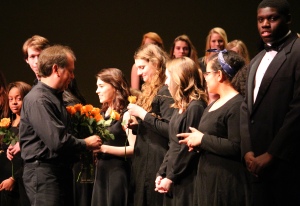
Presenting Nashville School of the Arts choir officers with roses, an annual tradition at my spring choral concerts for many years ~ May 13, 2013, Ingram Hall, Blair School of Music, Vanderbilt University, Nashville
In my experience, students who were new to my program were the hardest to convince that the difficult journey of preparation was worth the fierce effort this work demands. Once students had been through the entire process from the downbeat of the first rehearsal to the final cadence of the last concert, the great majority of them were willing and eager to bring their full attention to the work in class most of the time, with a knowledge rooted in experience that this effort was worth it. Over years, they would learn to embrace the effort itself for its own sake.
Consider the context and content of your performances carefully. Moments from these events are more likely to become persistent memories for all involved than the routine work of the classroom – it is important that overall, these experiences are positive and heartwarming. In many school environments, your program’s performances will often be expected annual events (e.g. the annual December holiday concert, the spring musical, etc.) For instance, in several schools I taught at, every December my program presented a Winter Solstice celebration, and I never taught at a school where I did not produce a spring concert of one kind or another.
Adding elements to your program and performances that become traditions for you and your students are a way to strengthen memories too. One song that I taught students of all ages in every choral program I directed was the beautiful old canon How Great Is The Pleasure, and although we did not often sing it in performances, it was usually part of our warmup before we went on stage, and we sang it frequently throughout the year. The final activity I did for most of my career with nearly every performing ensemble before we went on stage was The Count, a powerful and effective concentration exercise – and a ritual element that helped bind our tiny musical community together.
During my tenure with Music City Youth Orchestra from 2007 – 2012, we closed nearly every concert with a performance of Electric Light Orchestra’s Mr. Blue Sky. I feel certain that, for most of the (now young adult) former students who participated in those ensembles, whenever they hear Mr. Blue Sky on the radio or in the soundtrack of a movie today, they remember those experiences we shared – as I do.
Most music teachers employ similar strategies when designing their own programs, whether consciously or unconsciously. When done with intention, these carefully chosen activities become a structure in which the shared experience of community lives within the hearts and minds of your students. The long months and years of working together patiently toward a distant goal, and at last producing and witnessing the successful fulfillment of that goal, can become a model for them of the power and possibility of positive community in their lives. They will carry these impressions into adulthood, and perhaps some of them will go on to change the world around them in a similar fashion.
It is right that the majority of our time in the classroom is spent attending to the details of transmitting our art to the next generation – this is our work. But be careful not to miss the forest for the trees. Bear in mind that for the most part, what your students will take away are their memories. And they will remember if you loved them.
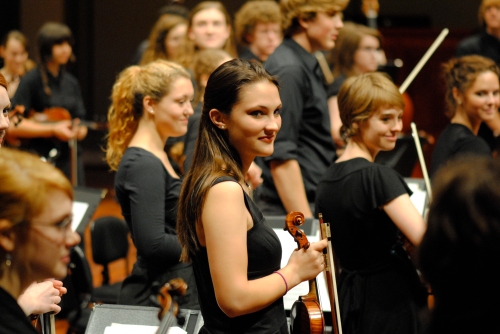
Music City Youth Orchestra after a performance at Schermerhorn Symphony Center, Nashville, May 22, 2011
This article appeared in the November/December 2018 issue of Choral Director magazine.
Related articles:

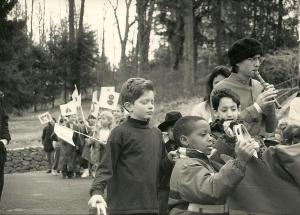
Undeniably true for all time! Treat a student and all people as if they are your sons and daughters.
so important to remember…
[…] The benefits of a quality music education are many, and I have begun to describe them here on Off The Podium in articles such as Wholehearted Attention and What Your Students Will Remember. […]
[…] What Your Students Will Remember […]
[…] What Your Students Will Remember […]
[…] What Your Students Will Remember […]
[…] What Your Students Will Remember […]
[…] What Your Students Will Remember […]
[…] What Your Students Will Remember […]
[…] See also What Your Students Will Remember […]
[…] What Your Students Will Remember […]
[…] What Your Students Will Remember […]
[…] 2. What Your Students Will Remember […]
[…] The Spring Concert can also be an emotional event, as students who have completed their time in the program prepare to move on to the next stage of their lives, and say goodbye to their friends and their teachers. In many cases, the relationships students make in their arts programs are the closest and most impactful relationships they make in high school, and these provide cherished memories that last a lifetime. […]
[…] What Your Students Will Remember […]
[…] What Your Students Will Remember […]
[…] What Your Students Will Remember […]
[…] What Your Students Will Remember (November/December) […]
[…] What Your Students Will Remember […]
[…] What Your Students Will Remember (2017) […]